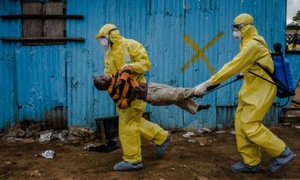
Daniel Berehulak embarked on his assignment to West Africa during the height of the Ebola crisis with few goals, except to document the personal stories of those impacted by the deadly virus.
He wasn’t prepared for what he saw.

“The most shocking was seeing the scale of death … There was just so much death,” Berehulak told Guardian Australia.
The experienced Australian photographer won a coveted Pulitzer prize in feature photography for his series on Ebola, shot for the New York Times.
He visited the continent four times and spent a total of 103 days documenting the horror wrecked by the disease, which has killed more than 10,700 people since the current outbreak was identified just over 12 months ago.
“One thing that really struck home was that this disease doesn’t have a base, doesn’t need a passport to cross borders,” he said.
“This virus preys on our humanity, it preys on the caregivers,” Berehulak said. “There’s something so sinister and ghastly about this. It scares the hell out of me.”
The photographer, who works for Reportage by Getty Images, took a great deal of precautions in shooting the photos. He dressed in protective gear, mandated by the US centres for disease control and prevention (CDC), and kept his distance from patients and their family members.
That physical and emotional distance was, at times, difficult to maintain.
Berehulak was deeply affected by the story of eight year old James Dorbor. The young boy and his father waited outside an Ebola clinic in Liberia’s capital Monrovia for three hours, waiting for a bed to free up.
In that time, the boy’s health deteriorated dramatically, and when he was finally admitted, his father was told that he could not touch or embrace him, in case he contracted the disease.

Medical staff came to take James away, but because they were not properly covered they were careful in how they held him, and ended up picking him up “like he was a bag of garbage”, Berehulak said.
Berehulak wanted to help, but knew he couldn’t. “There was nothing I could do,” he said, noting the danger of contracting the disease. “I needed to keep vigilant and know that my task was to be there and tell a story.”
It is a story he wants to continue being told. He is adamant that the plight of Ebola sufferers and their struggling communities not be forgotten.
“It’s our responsibility to keep the story in the news.”
Berehulak was “overcome by emotion” after finding out that he had won the Pulitzer prize for his extensive series in West Africa, the first Australian to win a Pulitzer in the photo feature category.
“I was elated,” he said. “I felt that I was paying tribute to the people who had lost their lives.”
Berehulak grew up in Sydney to Ukrainian parents. He is now based in New Delhi, and in 2010 was nominated for the highly-regarded American Pulitzer prize for his work on the Pakistan floods. He has also won three World Press Photo awards.
He praises the commitment of some editors to long-form journalism, which he says highlights the “beauty and the power” of journalistic story-telling.
